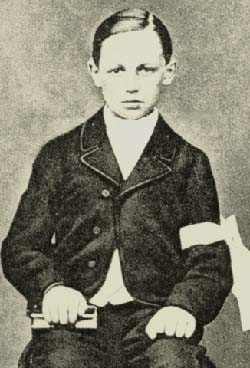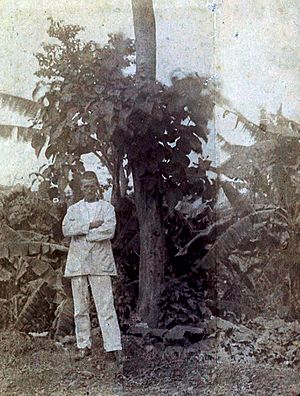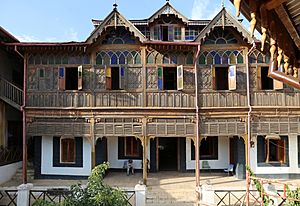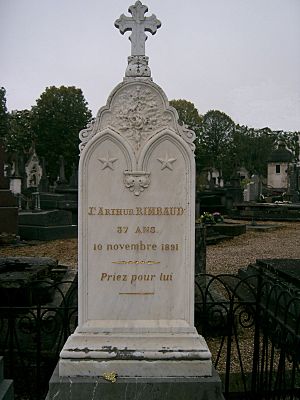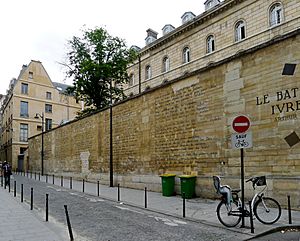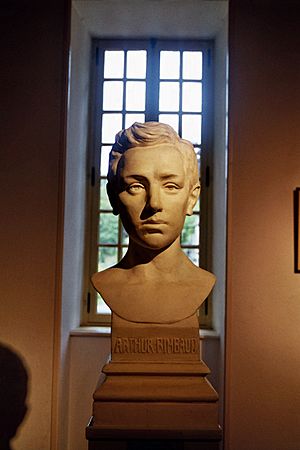Arthur Rimbaud facts for kids
Quick facts for kids
Arthur Rimbaud
|
|
|---|---|
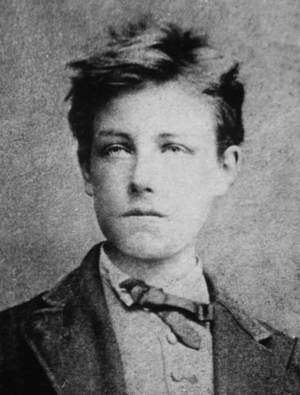
Rimbaud at 17 by Étienne Carjat
|
|
| Born | Jean Nicolas Arthur Rimbaud 20 October 1854 Charleville, Champagne, France |
| Died | 10 November 1891 (aged 37) Marseille, Provence, France |
| Resting place | Charleville-Mezieres Cimetière, Charleville-Mezieres, France |
| Occupation | Poet |
| Period | 1870–1875 (major creative period) |
| Literary movement | Symbolism |
| Notable works |
|
| Partner | Paul Verlaine (1871–1875) |
| Relatives |
|
| Signature | |
Jean Nicolas Arthur Rimbaud (born October 20, 1854 – died November 10, 1891) was a famous French poet. He is known for his unique and imaginative poems. Rimbaud's work greatly influenced modern literature and art. He was born in Charleville, France.
Arthur Rimbaud started writing at a very young age and was an excellent student. However, he left school as a teenager to travel to Paris during the Franco-Prussian War. Most of his important poems were written when he was a teenager and young adult. Rimbaud stopped writing poetry completely by age 20, after finishing his last major work, Illuminations.
After he stopped writing, Rimbaud traveled a lot. He explored and worked as a merchant in different parts of the world. He died from cancer shortly after his 37th birthday. As a poet, Rimbaud is famous for his contributions to Symbolism. His work, like A Season in Hell, helped shape modernist literature.
Contents
Arthur Rimbaud's Early Life
Family and Childhood (1854–1861)
Arthur Rimbaud was born in Charleville, a town in northeastern France. He was the second child of Frédéric Rimbaud and Marie Catherine Vitalie Rimbaud. His father, Frédéric, was an army captain who had served in many places. He was described as friendly and generous.
Arthur's mother, Vitalie, was very different from his father. She was known for being strict and serious. Arthur sometimes called her "Mouth of Darkness." His parents married in 1853, but his father was often away because of his military duties. Captain Rimbaud was rarely home for his children's births or baptisms. After 1860, his father stopped coming home altogether. Even though they never officially divorced, the separation was complete.
Schooling and Teen Years (1861–1871)
In 1862, Mrs. Rimbaud moved her family to a better neighborhood. She sent Arthur and his older brother to Pension Rossat, a respected school. She was very strict about their studies and pushed them to succeed. She would make them memorize many lines of Latin poetry.
As a boy, Arthur was small and pale with light brown hair. His friend, Ernest Delahaye, said he had "the loveliest eyes." Arthur was a devout Catholic like his mother and had his First Communion at age eleven. He and his brother later attended the Collège de Charleville.
Arthur was a very successful student. He excelled in most subjects, especially languages. In 1869, he won eight first prizes in French academic competitions. The next year, he won seven more. His teachers noticed how quickly he could learn.
A new teacher, 22-year-old Georges Izambard, became Rimbaud's mentor. Izambard encouraged Arthur to write his own poems in French and Latin. Rimbaud's first published poem, "The Orphans' New Year's Gifts," appeared in a magazine in January 1870. He was just 15.
Rimbaud showed great talent as a poet. One of his early poems, "Ophélie", is still considered one of his best. In July 1870, the Franco-Prussian War began. Rimbaud, feeling bored and restless, ran away to Paris. He was arrested for not having a train ticket. Izambard helped him get released, and Rimbaud stayed with Izambard's aunts for a short time before returning home. However, he ran away again just ten days later.
Life with Paul Verlaine (1871–1875)
Rimbaud wrote to several famous poets, but only Paul Verlaine replied. Verlaine was an important poet who would later lead the Symbolist movement. Rimbaud sent Verlaine some of his poems, including "The Sleeper in the Valley." Verlaine was impressed and invited Rimbaud to Paris.
Rimbaud arrived in Paris in September 1871 and stayed with Verlaine. Verlaine described the 16-year-old Rimbaud as having "the real head of a child" on a "big, bony body." He also noted Rimbaud's strong accent.
Rimbaud and Verlaine became close friends and traveled together. They lived an adventurous life, moving to London in September 1872. They lived in poverty, earning money by teaching. Rimbaud spent his days reading and studying at the British Museum. Their friendship became difficult, and Verlaine left London to go to Brussels.
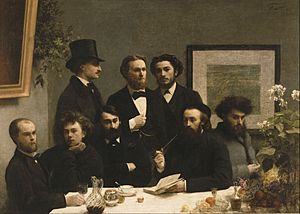
Many people at the time found Rimbaud to be rude. The artist Henri Fantin-Latour painted a famous picture called By the table in 1872. It shows Rimbaud and Verlaine at the end of a table with other writers. Some writers did not want to be painted with Rimbaud and Verlaine.
In July 1873, Verlaine asked Rimbaud to meet him in Brussels. Their reunion was not good, and they argued. Verlaine was later sentenced to two years in prison.
Rimbaud returned home to Charleville and finished his prose work Une Saison en Enfer ("A Season in Hell"). This work is still seen as a very important example of modern Symbolist writing. In 1874, he went back to London with another poet, Germain Nouveau. There, he worked on his collection of prose poems called Illuminations. This collection was published later in 1886 without Rimbaud knowing.
Travels and Adventures (1875–1891)
Rimbaud and Verlaine met for the last time in March 1875. By this time, Rimbaud had decided to stop writing poetry and live a more settled life. A famous poet, Stéphane Mallarmé, later described Rimbaud as a "meteor" who appeared suddenly and then vanished from the world of poetry.
Rimbaud studied several languages and then traveled widely across Europe, often on foot. In 1876, he joined the Dutch Colonial Army to get free passage to Java in Indonesia. However, he deserted the army four months later and escaped into the jungle. He managed to return to France secretly.
In December 1878, Rimbaud traveled to Larnaca in Cyprus. He worked there as a foreman at a stone quarry. The next year, he had to leave Cyprus because of a fever, which was diagnosed as typhoid when he returned to France.
In 1880, Rimbaud settled in Aden, Yemen, working for a trading company. He then moved to Harar, Ethiopia, to run the company's office there. In 1884, he wrote a report about the Ogaden region, which was published by a geography society in Paris. That same year, he started his own business in Harar, trading in coffee and firearms.
Rimbaud became friends with the Governor of Harar, Ras Mekonnen Wolde Mikael Wolde Melekot. He was a pioneer in the coffee business, being the first European to export the famous Harar coffee. He was also one of the first Europeans to do business in the city.
In 1885, Rimbaud tried to sell old rifles to Menelik II, the king of Shewa. This deal faced many problems, including a ban on selling weapons. The whole plan turned out to be a disaster for Rimbaud.
Between 1888 and 1890, Rimbaud opened his own store in Harar. However, he soon grew bored with it. Other explorers and merchants who visited him described him as intelligent, quiet, and secretive about his past. They noted that he managed his business with honesty and care.
Sickness and Death (1891)
In February 1891, while in Aden, Rimbaud developed severe pain in his right knee. The pain got worse, and he decided to return to France for better medical care. A British doctor mistakenly thought it was a different illness and suggested immediate amputation.
Rimbaud left Aden on May 7 and traveled back to France. When he arrived in Marseille, he was admitted to the hospital. A week later, on May 27, his right leg was amputated. Doctors then discovered he had bone cancer, likely osteosarcoma.
After a short stay at his family farm, he tried to travel back to Africa. But his health worsened, and he was readmitted to the hospital in Marseille. He suffered a lot of pain, and his sister Isabelle cared for him. He received the last rites from a priest before he died on November 10, 1891, at the age of 37. His body was sent back to his hometown, and he was buried in Charleville-Mézières.
Arthur Rimbaud's Poetry
Arthur Rimbaud's first poems were similar to the style of the Parnasse school and other poets like Victor Hugo. However, he quickly developed his own unique style. Later, he was greatly inspired by Charles Baudelaire. This inspiration helped him create the style of poetry known as Symbolism.
In May 1871, when he was 16, Rimbaud wrote two letters explaining his ideas about poetry. These are known as the Lettres du voyant ("Letters of the Seer"). In these letters, he shared his revolutionary ideas about poetry and life. He also criticized some famous poets, though he admired Charles Baudelaire.
Rimbaud expressed similar ideas in his poem "Le Bateau ivre" ("The Drunken Boat"). This long poem tells the story of a boat that breaks free from people. The boat then drifts and sees amazing and sometimes strange visions of the sea. It ends with the boat wishing to sink and become one with the ocean.
While "Le Bateau ivre" still used a somewhat traditional style, Rimbaud's later poems from 1872 became even more experimental. They used unusual rhythms and loose rhyming patterns. His themes also became more abstract and dreamlike.
After Une saison en enfer, Rimbaud wrote the prose poems known as Illuminations. In this collection, he completely abandoned traditional structures. He explored new ways of using poetic language, creating pieces that felt disjointed and dreamlike. Rimbaud died without knowing that his poems had been published and were being praised and studied.
He then stopped writing poetry completely. His friend Ernest Delahaye said that Rimbaud seemed to have forgotten his past as a poet. The French poet Gérard Macé noted that Rimbaud's silence after writing is as famous as his work.
The French poet Paul Valéry said that "all known literature is written in the language of common sense—except Rimbaud's." His poetry influenced many art movements, including the Symbolists, Dadaists, and Surrealists. Later writers adopted his themes and his creative use of form and language.
Arthur Rimbaud's Letters
Rimbaud wrote many letters throughout his life. These letters give us a clear picture of his experiences and relationships. His letters about his literary life were first published in different magazines. Later, they were collected into books. The letters he wrote from Africa provide interesting details about his travels and work there.
Arthur Rimbaud's Works
Works Published Before 1891
- "Les Étrennes des orphelins" (1869) – a poem published in La revue pour tous, January 2, 1870
- "Première soirée" (1870) – a poem published in La charge, August 13, 1870
- "Le rêve de Bismarck" (1870) – a prose piece published in Le Progrès des Ardennes, November 25, 1870
- "Le Dormeur du val" (The Sleeper in the Valley) (1870) – a poem published in Anthologie des poètes français, 1888
- "Voyelles" (1871 or 1872) – a poem published in Lutèce, October 5, 1883
- "Le Bateau ivre", "Voyelles", "Oraison du soir", "Les assis", "Les effarés", "Les chercheuses de poux" (1870–1872) – poems published by Paul Verlaine in his book Les Poètes maudits, 1884
- "Les corbeaux" (1871 or 1872) – a poem published in La renaissance littéraire et artistique, September 14, 1872
- "Qu'est-ce pour nous mon cœur…" (1872) – a poem published in La Vogue, June 7, 1886
- Une Saison en Enfer (1873) – a collection of prose poetry published by Rimbaud himself in Brussels in October 1873
- Illuminations (1872–1875 ?) – a collection of prose poetry published in 1886
- Rapport sur l'Ogadine (1883) – published by the Société de Géographie in February 1884
Posthumous Works (Published After His Death)
- Narration ("Le Soleil était encore chaud…") (c. 1864–1865) – prose published in 1897
- Lettre de Charles d'Orléans à Louis XI (1869 or 1870) – prose published in Revue de l'évolution sociale, scientifique et littéraire, November 1891
- Un coeur sous une soutane (1870) – prose published in Littérature, June 1924
- Reliquaire – Poésies – published by Rodolphe Darzens in 1891
- Poésies complètes (c. 1869–1873) – published in 1895 with an introduction by Paul Verlaine
- "Les mains de Marie-Jeanne" (1871 ?) – a poem published in Littérature, June 1919
- Lettres du Voyant (May 13 & 15, 1871) – letters to Georges Izambard and Paul Demeny, published in 1912 and 1928
- Album Zutique (1871) – parodies, May 1922
- Les Déserts de l'amour (Deserts of Love) (c. 1871–1872) – prose published in La revue littéraire de Paris et Champagne, September 1906
- Proses "évangeliques" (1872–1873) – three prose texts, published in 1897 and 1948
- Lettres de Jean-Arthur Rimbaud – Égypte, Arabie, Éthiopie (1880–1891) – published in 1899
Cultural Impact
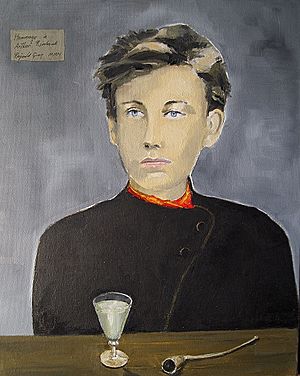
Arthur Rimbaud's influence extends beyond literature to art and even politics. Professor Martin Sorrell from the University of Exeter notes that Rimbaud inspired many movements. His work has influenced musicians like Jim Morrison, Bob Dylan, and Luis Alberto Spinetta. Writers like Octavio Paz and Christopher Hampton have also been inspired by him.
In 1961, composer Regina Hansen Willman created a song using Rimbaud's text "Apres le Deluge."
Rimbaud's life has been shown in several films:
- Una stagione all'inferno (1971) starred Terence Stamp as Rimbaud.
- Total Eclipse (1995), directed by Agnieszka Holland, featured Leonardo DiCaprio as Arthur Rimbaud and David Thewlis as Paul Verlaine.
Rimbaud is also the main character in the opera Rimbaud, ou Le Fils du soleil (1978) by Italian composer Lorenzo Ferrero.
The Canadian band Red Rider's 1979 song "White Hot" talks about Rimbaud's time trading guns in Somalia. In 2012, composer John Zorn released a CD called Rimbaud, with music inspired by his poems. The band CocoRosie mentions Rimbaud in their song "Terrible Angels." British composer Benjamin Britten set parts of Rimbaud's Illuminations to music in his 1939 composition.
In the 2007 film I'm Not There, a young Bob Dylan (played by Ben Whishaw) identifies himself as Arthur Rimbaud. Bob Dylan has mentioned Rimbaud many times in his music career. His 1975 song "You're Gonna Make me Lonesome When you Go" includes the line:
Mine've been like Verlaine's and Rimbaud.
Also in 1975, Patti Smith's song "Land" from her album Horses refers to Rimbaud by name.
The artist and writer David Wojnarowicz created a photography series called "Arthur Rimbaud in New York" (1978–1979). He photographed friends wearing an Arthur Rimbaud mask in different parts of New York City.
Jim Jarmusch's 2009 film The Limits of Control begins with a quote from Rimbaud's poem Le Bateau ivre:
As I descended into impassible rivers
I no longer felt guided by the ferrymen...
On The Clash's 1982 album Combat Rock, poet Allen Ginsberg says Rimbaud's name in the song "Ghetto Defendant."
Richard Meyers changed his last name to Hell after Rimbaud's poem A Season in Hell.
Rimbaud even left his mark in history by carving his name into the ancient stone of the Temple of Luxor in Egypt.
See Also
 In Spanish: Arthur Rimbaud para niños
In Spanish: Arthur Rimbaud para niños
- Rimbaud and Verlaine Foundation
- Zutiste
- Total Eclipse


